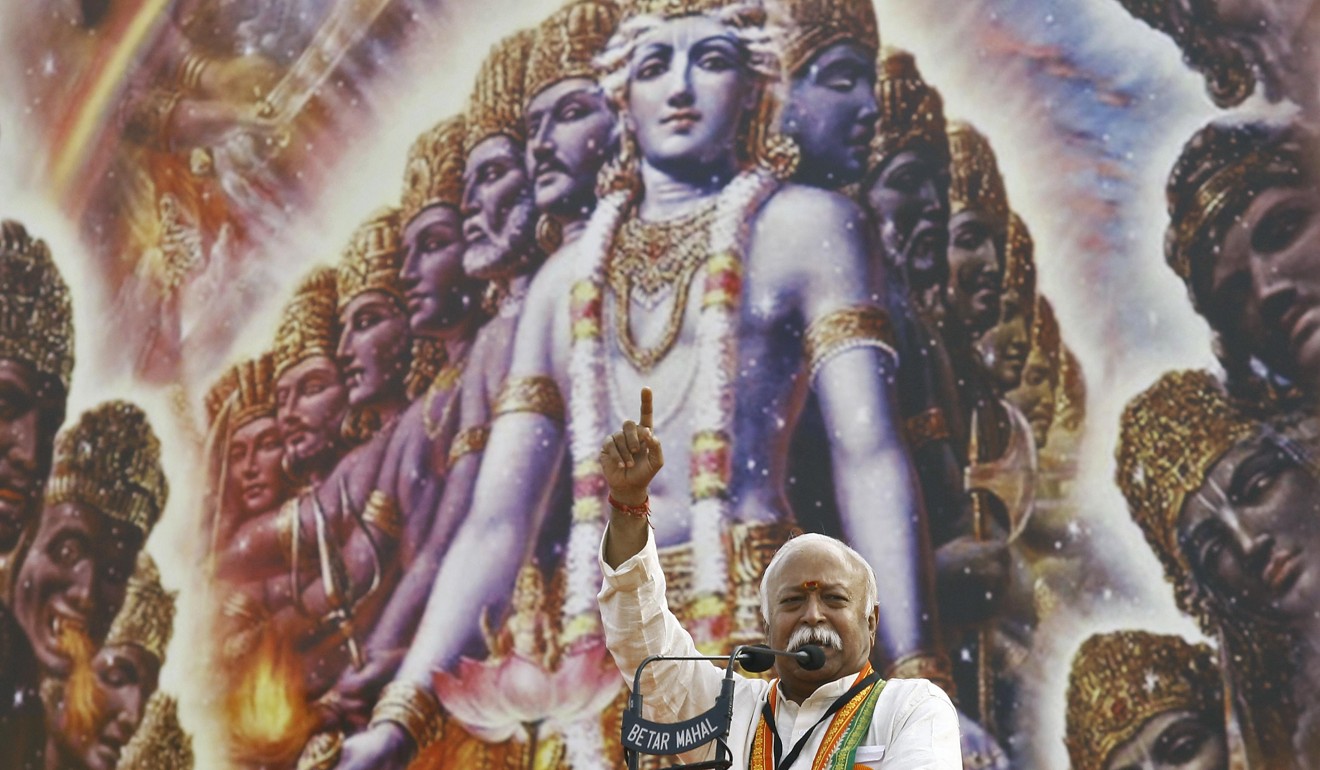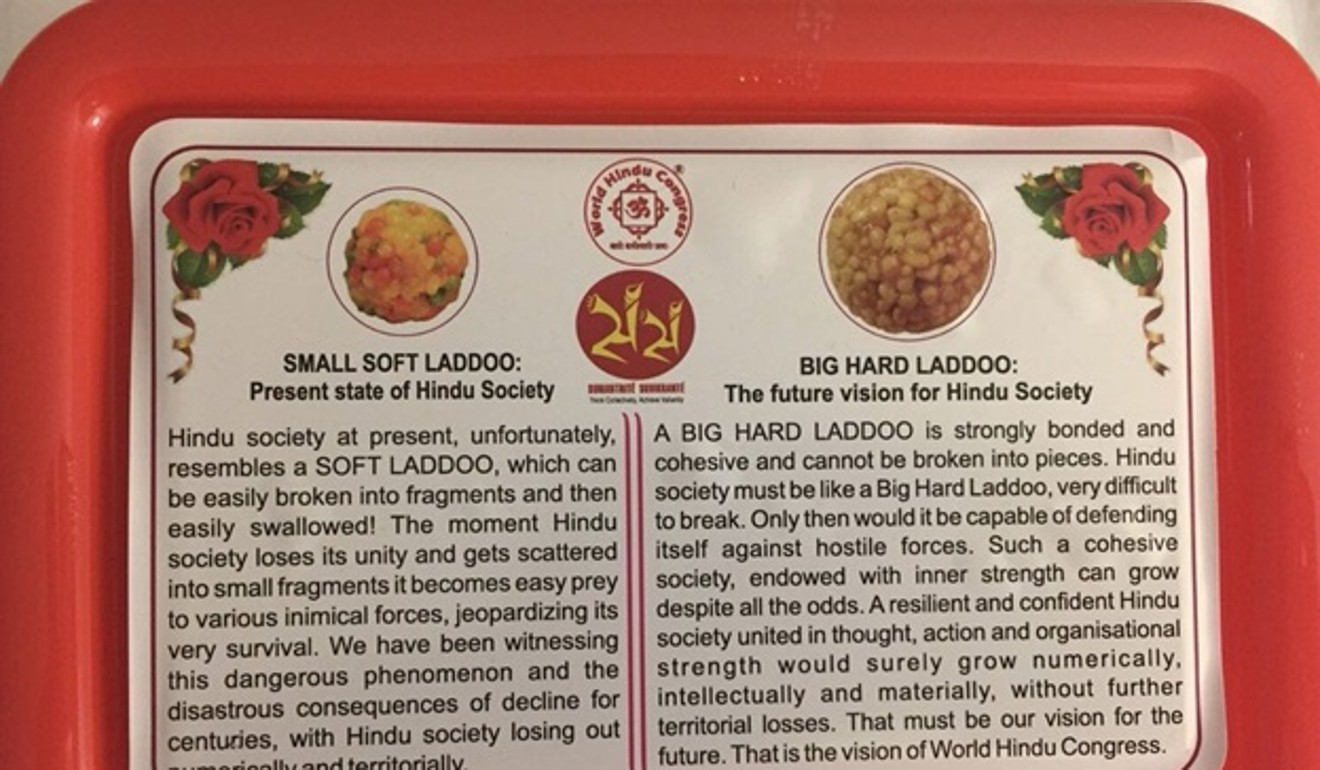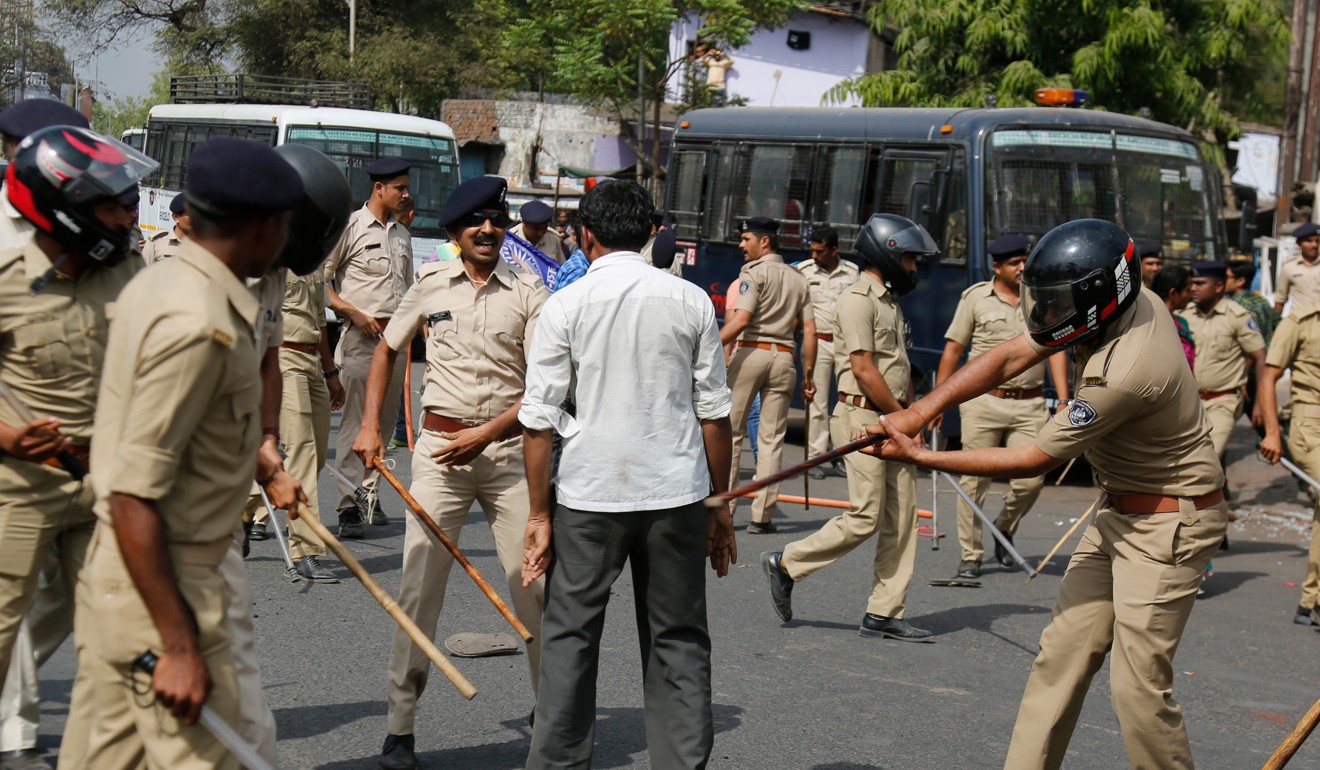⇩ Use your ears. Click below to hear this post.
|
|
The recent World Hindu Congress in Chicago, an attempt to endow the intolerant majoritarian philosophy of Hindutva with international legitimacy, couldn’t have chosen a better time to bring the party to the US.
Socialism, the saying goes, subjects art to politics, while fascism is guilty of the opposite. The goal of the extreme aestheticisation of symbols of power in fascist regimes – such as the exquisitely choreographed columns of the faithful hailing Hitler in the Nazi propaganda film Triumph of the Will – is to make violence palatable, comprehensible, and even attractive.
The aesthetic dimension of fascist – or, more generally, authoritarian – regimes also serves to distract from the absurdity of the actions of such regimes. Vladimir Putin, Kim Jong-un, and Robert Mugabe all fit this bill, so did a gathering of Hindus from around the globe at the World Hindu Congress, held from September 7 to 9, in that historic Hindu city: Chicago.
For Modi’s India, 2+2=0 as Trump tightens the leash
Nominally, at least, the event was homage to the Indian monk Swami Vivekananda, who 125 years ago inaugurated a civilisational dialogue between Hinduism and the West by delivering a landmark speech in the Windy City. Yet, far from being an inclusive event aimed at building bridges, the World Hindu Congress was essentially dedicated to propagating the Hindu majoritarian philosophy of Hindutva and seeking to endow it with international legitimacy.
Inspired by European ethno-nationalism and fascism, and by figures such as Giuseppe Mazzini and Hitler, Hindutva rejects the constitutional secularism of the Indian state; proposes that India is fundamentally a Hindu nation; and insists that minorities, especially Muslim and Christian Indians, are aliens in a Hindu country.
Assaults on Dalits are among the manifestations of minority targeting following the election victory of the Hindu nationalist Bharatiya Janata Party. Photo: AP
With the election victory of the Hindu nationalist Bharatiya Janata Party (BJP) in 2014, an unofficial government scheme of targeting minorities has been well under way in India. Lynchings of Muslims by vigilante Hindu groups on the pretext of possessing beef, a crime in numerous Indian states given the sacred status of the cow for many Hindus; assaults on Dalits, or former “untouchables” located beneath the caste hierarchy of Hinduism; and a strident jingoism stoked by openly partisan state officials and media persons have been accompanied by a crackdown on dissenting voices in the academic, artistic, and activist communities.
Aside from some ineffectual squeaks, India’s hardliner Prime Minister Narendra Modi has done little to rein in the violence. Neither have the leaders of the Rashtriya Swayamsevak Sangh (RSS), the mother ship of the Hindu Right, of which the BJP is the political wing.
Why the world needs to sit up and take notice of India’s war on meat
The World Hindu Congress is, essentially, the global version of this project. And in a peculiar, topsy-turvy, Alice in Wonderland kind of way, it makes sense that it should be held in the United States. For one, the World Hindu Congress is part of a Hindu supremacist movement, remarkably similar in its characteristics to the White supremacist resurgence in the US since the announcement of Trump’s candidacy and his subsequent election victory in 2016.
In both societies, the leaders, their parties, and their core base have milked the utterly illogical narrative of a privileged majority – Whites in the US and caste Hindus in India – being oppressed by marginalised minorities, namely impoverished immigrants and people of colour in the US, and Muslims in India. Both leaders, Modi and Trump, in keeping with the time-honoured traditions of fascism, are narcissistic as well as insecure, framing any criticism aimed at them as unpatriotic and treasonous.

Reliant on propaganda, thanks to a pliant Indian media in Modi’s case and outright falsehoods in Trump’s, both leaders claim with straight faces that they are the victims of fake news. Supporters of both regimes have engaged in dog-whistling against dissenters, putting the latter in physical danger. In both contexts, informed commentators have warned of the very real signs of fascism displayed by the Modi and Trump governments.
All of this was seen in ample measure at the World Hindu Congress. The picture of privileged caste Hinduism was embellished by a sense of injured victimhood, and a notion of a peaceful, tolerant Hinduism under siege from Western academics, terrorists, and secularists. While there was no mention of casteism and caste violence in Hinduism, RSS head Mohan Bhagwat kicked up a storm with his choice of metaphors in his speech. Asking the world’s Hindu community to work together, he said even a lone lion could be attacked and killed by a pack of wild dogs, drawing allegations that he was comparing non-Hindus to dogs.
Why a 4,500-year-old skull is key to the politics of India’s Hindu-Muslim divide
Also on display were the curious contradictions and deep hypocrisy of the project of the Hindu Right. For one, the Hindu Right constantly rants about what it terms “Abrahamic religions”, by which it refers primarily to Islam and Christianity, both of which it sees as out to steal Hindu souls by nefarious means. Judaism is exempt, since Israel is seen by the Hindu Right as a natural ally against the common Muslim enemy, never mind that Judaism, too, is an Abrahamic faith. The folks at the World Hindu Congress were also strategically quiet about American Christianity, though in India, they have made a career of seeking attention by ranting about Christian misdeeds in India.
 An analogy involving a laddoo, a spherical Indian sweet, spoke volumes about the World Hindu Congress’ ideal of Hindu identity. Photo: Handout
An analogy involving a laddoo, a spherical Indian sweet, spoke volumes about the World Hindu Congress’ ideal of Hindu identity. Photo: Handout
The American Hindu Right’s relationship to Trump reeks of the worst hypocrisy even as it is fundamentally incoherent. As minorities, long-distance non-resident Indian (NRI) Hindu nationalists readily accept and enjoy the benefits of secularism, freedom of religious expression, evangelising (think ISKCON, or the Hare Krishna movement), and affirmative action in the US, while going ballistic about the same or similar rights for minorities in India.
Some Hindus, in India and the US, have eagerly endorsed Trump for his anti-Muslim stance, even though Trump has also singled out Indians (including Hindus) in Silicon Valley as a group whose immigration to the US needs to be curtailed. Other NRI Hindus are critical of Trump in the American context but do not see the contradiction in supporting Modi in the Indian setting for the very same policies.
India: no country for Muslims
Perhaps the cumulative absurdity of the World Hindu Congress was captured best in a tray that popped up at the event. In the icing on the eggless cake, attendees were told that Hinduism had to transform itself from a soft laddoo – a spherical Indian sweet – to a hard one. The reason animating this brilliant metaphor was that such a hard, internally unified Hindu laddoo would keep Hinduism territorially, materially, intellectually, and spiritually strong.
What this Hindu ideal of identity gave away was the monocultural, monolithic vision of Hinduism that excites the World Hindu Congress. For a religion and tradition famed for its cuisines, confectionery, and diversity of culinary flavours, the best that the World Hindu Congress could come up with was a saffron ball of a single flavour, made up of similar, minuscule saffron balls of the same flavour: an unimaginative, narrow, and dull concept of Hindu identity if there ever was one.
Let’s just hope that Trump, in one of his fascist moments, isn’t inspired by the World Hindu Congress to proclaim white bread as the national dish of the US. A very hard white bread.
see source
